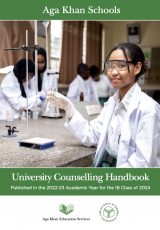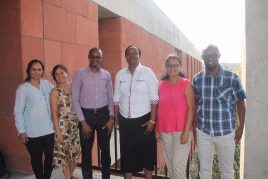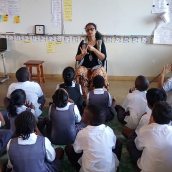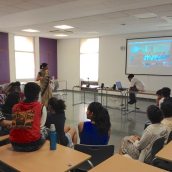Aga Khan Academy Knowledge Exchange Initiatives
During this exchange, the teachers interacted with students, shadowed their counterparts and shared curriculum inputs through planning and executing lessons together. “I have personally become more confident with my work and have learnt many new strategies for inquiry based learning,” shares Ira. During the exchange programme, she contributed her own subject expertise in chemistry to biology students, strengthening students’ understanding of the interconnectedness between the two subject areas. Sathya echoed similar sentiments and appreciated the opportunity to collaborate with colleagues in the Department of English and Theory of Knowledge, which helped him better understand diverse teaching strategies, selection of books and techniques employed to engage different learner communities.
Laboni participated in different activities across various grades in AKA Mombasa’s Junior School including unit celebrations, summative assessments and Primary Years Programme Exhibition action plans. She felt the exchange programme was extremely valuable for her as an educator: “Overall, I felt the exchange programme has given me tremendous exposure to different ways of teaching and learning within the same system. A great experience.”
Sparking Student Collaboration
While the network teacher exchange programme was beneficial for the growth of teachers at the Academies, this programme also sparked an important student collaboration initiative between the two sister institutions. Vasanthi Thandlam from Hyderabad and Johnson Monari from Mombasa, who met while Johnson was visiting Hyderabad, saw the network teacher exchange programme as a springboard to connect students from the sister institutions, exemplifying the benefits of belonging to a network of academic institutions through a formal exercise in direct student collaboration and exchange. On 26 May 2017, grade 6 students from Mombasa and Hyderabad were connected through videoconference to discuss their English unit on Shakespeare.
“It was an exciting day for our sixth graders as they eagerly awaited meeting their Mombasa friends,” recollected Vasanthi. “Johnson and I had made prior arrangements and we started off really well with both AKA Hyderabad and Mombasa students greeting each other. In the beginning, the students introduced themselves and later we moved to a Q&A session, which was followed by discussions on Shakespeare. We found that the students had researched on the given topic and had come prepared for the meeting.”
Although the discussion was centered on the work of Shakespeare, students also shared information about their cultures, food, languages and schools. “As the unit was on Shakespeare, we asked each other questions about him and I really enjoyed the discussion since it enhanced my knowledge about the writer,” wrote Hyderabad grade 6 student Roshanuddin Khedri. “We have gained awareness about India and Kenya, especially regarding language. This empowered me with a lot of knowledge about both countries with which I am unfamiliar since I am from Afghanistan, and promoted pluralism because we talked about similarities and differences."
The Aga Khan Academies hope to continue this collaboration across institutions with both teachers and students as they move forward into the next academic year.
By Karina Hussein
Newsletter readers please click here to return to the newsletter (browser version)
publications







